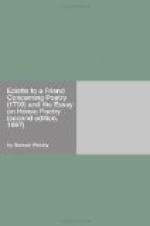The Matter is next in an Heroic Poem, which must be one important Action; it must be important, Res gestae Regumque Ducumque, with Horace. “It only speaks of Kings and Princes,” says Rapin, by which he must mean that it chiefly and principally turns upon them: for both Virgil and Homer have occasion for Traitors, and Cryers, and Beggars, nay even Swineherds (in the Odysses), and yet still more, of whole Armies, which can’t be all compos’d of Kings and Princes. However, the more there is of these lower Walks in the Plan of a Design, the less Heroic it must appear, even in the Hands of the greatest Genius in Nature. Such a Genius, I think, was Homer’s, and yet the Truth of this Assertion will be plain to any who compares his Odysses with his Iliads; where he’ll find, if ’tis not for want of Judgment, in the latter a very different Air from the former, in many places much more dead and languishing, and this which I have given, seems one probable Reason on’t; not excluding that of Longinus, that Homer was then grown old, and besides too much of the Work was spent in Narration; to which may be added, that he here design’d a wise and prudent rather than a brave and fighting Hero, having wrought off most of the Edg and Fury of his Youthful Spirit and Fury in Achilles, as in Ulysses he express’d more of Age and Judgment.
This Action must be one and uniform: the Painture of one Heroic Action, says Rapin from Aristotle. It must be, as Bossu from Horace, simplex duntaxat & unum, that is, the principal Action on which the whole Work moves ought to be one, otherwise the whole will be confus’d; tho’ there may be many Episodic Actions without making what Aristotle calls an Episodic Poem, which is, where the Actions are not necessarily or not probably link’d to each other, and of such an irregular multiplication of Actions and Incidents. Bossu instances very pleasantly in Statius’s Achilleid; but he tells us there’s also a regular and just Multiplication, without which ’twere impossible to find matter for so large a Poem, when as before it’s so ordered that the Unity of the whole is not broken, and consequently divers Incidents it has bound together are not to be accounted different Actions and Fables, but only different Parts not finish’d, or entire of one Action or Fable entire or finished: and, agreeable to this Doctrine, Rapin blames Lucan’s Episodes as too far-fetch’d, over-scholastic, and consisting purely of speculative Disputes on natural Causes whenever they came in his way, not being link’d with the main Action, nor flowing naturally from it, nor tending to its Perfection.




